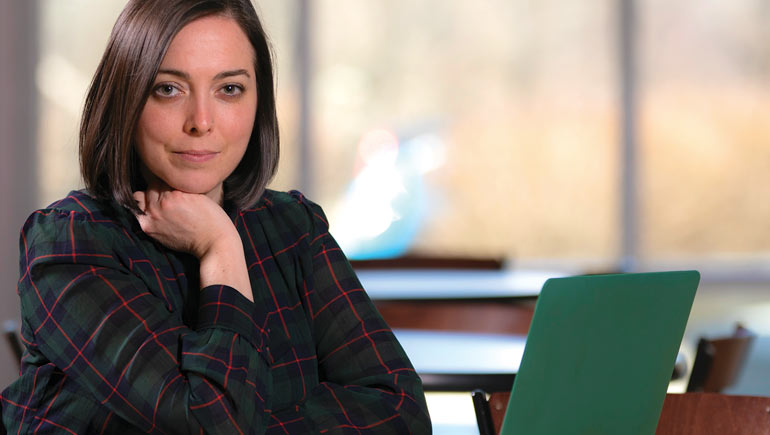Better outcomes for those in greatest need
Social work faculty research improves healthcare

Support systems for individuals with developmental disabilities have struggled to keep up with a major shift: people in this demographic are living longer. Jacqueline McGinley wants to help.
“For a time, people with developmental disabilities mostly lived in institutions, and typically lived until their late 30s,” says McGinley, assistant professor of social work in the College of Community and Public Affairs (CCPA). “In the 1970s, there was a transition toward living at home, which has many benefits. The challenge now is their parents are aging and dealing with health issues, so who supports people with disabilities when their caregivers can’t?”
McGinley says more people are creating advanced-care plans, and she wants to examine how these are carried out to ensure that people with developmental disabilities are cared for as they advance in age and develop serious illnesses.
“Death is an inevitability and, for many of us, the COVID-19 pandemic brought this reality to the fore,” McGinley says. “People are looking for ways to exert control over that, but we can’t. We can, however, have conversations about what matters when we are sick and what we want to happen when we die.”
Since arriving at CCPA this past August, McGinley has engaged in a number of collaborations within and outside the University, including an analysis of service plans in use across the United States and crafting curricula to prepare social workers to serve people with developmental disabilities.
McGinley is a member of the The Rural and Underserved Service Track (TRUST) faculty, a collaboration among Binghamton University’s Social Work Department in CCPA, Decker College of Nursing and Health Sciences, and School of Pharmacy and Pharmaceutical Sciences as well as SUNY Upstate Medical University and the community. TRUST is developing interprofessional teams to deliver care to those living in isolated areas or underserved populations such as the homeless.
She is partnering with social service agencies, creating a two-way communication loop as students learn from practitioners, and research responds to their needs. Once the pandemic hit, McGinley paused these partnerships so agencies could focus on helping clients.
“Illnesses often disproportionately affect people with disabilities, and COVID-19 is no different,” McGinley says. “What barriers prevent people with disabilities from getting adequate care? Will their symptoms be recognized quickly enough? Will they have transportation to get to the doctor or hospital? It’s insensitive to ask these questions now, but I’m holding them for an appropriate time. What happens during the pandemic can inform how smaller crises are handled because the underlying lack of equity is still there.”
Kim Brimhall, assistant professor of social work, is also focused on improving healthcare in rural communities, where people have lower incident rates for all cancer types, but die at a higher rate than urban counterparts.
Rural communities often have difficulty maintaining an adequate health workforce, and this impacts the ability to care for patients. Brimhall believes changing the culture in the clinical setting will lead to better outcomes. Her research focuses on how healthcare leaders can build environments where workers feel included and psychologically safe.
“When employees on a team feel valued and that they can trust one another, the teams perform better, retention is higher, and workers go above and beyond because they want to be there,” she says. “This results in better patient care.”
Brimhall works primarily with nonprofit hospitals because she’s drawn to their mission of providing high-quality care for everyone. Since 2017, she has collaborated with Ascension Lourdes Hospital in Binghamton.
“Being able to collaborate with Lourdes is one of the reasons I came to Binghamton,” she says. “I want to fight for organizations like Lourdes because they help populations experiencing the worst outcomes. Pilot data is showing us that teams with high trust are delivering better care. We’re going to track this over the long term, and use the findings to improve other healthcare systems serving rural and low-income people.”
Among other things, Brimhall gathers feedback from hospital employees about the networks they use to address workplace challenges. Communication channels don’t always align with the organizational chart.
“Many times, workers who have a problem confide in someone they trust regardless of whether they are in their department,” Brimhall says. “Trust is built through informal networks.”
Trust is an issue for patients as well. Rural and low-income patients may feel stigmatized and expect to receive inferior care.
“Research shows an increasing cancer death disparity [for rural and low-income people],” Brimhall says. “We need to earn their confidence, so they come away feeling they, too, will receive the best of care.”
Brimhall gathered her first set of data in July 2019, and had to postpone a subsequent collection of data because of COVID-19.
“This pandemic is the first of its kind of this magnitude, so it will be critical to understand how patient and provider experiences with COVID-19 have impacted patient and provider trust,” Brimhall says. “Sometimes, through unprecedented challenges, leaders emerge and rise to the occasion. This can positively impact trust and psychological safety. On the other hand, these could be diminished depending on how providers respond.”
